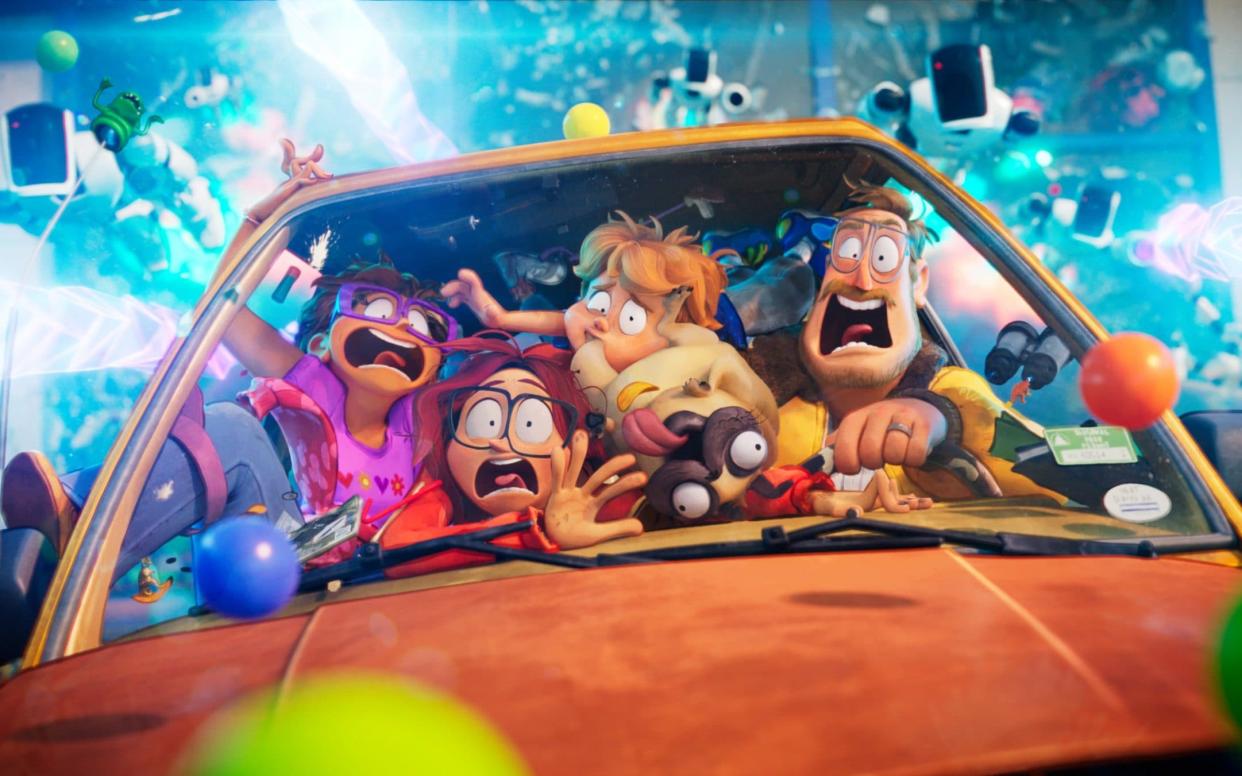The Mitchells vs The Machines, review: Olivia Colman turns evil in a masterpiece for kids

- Oops!Something went wrong.Please try again later.
- Oops!Something went wrong.Please try again later.
- Oops!Something went wrong.Please try again later.
- Oops!Something went wrong.Please try again later.
- Oops!Something went wrong.Please try again later.
- Oops!Something went wrong.Please try again later.
Dir: Michael Rianda. Starring: Abbi Jacobson, Danny McBride, Olivia Colman, Maya Rudolph, Michael Rianda (voices). PG cert, 114 mins
What would it take these days for a family on holiday to sheath their smartphones, shut off the Wi-Fi, and enjoy some old-fashioned, gadget-free quality time? The Mitchells vs the Machines offers the following plausible-sounding answer: a full-blown apocalyptic robot uprising, in which technology turns on humankind and a careless network connection could spell your doom.
The premise is put to relentlessly funny and ingenious use in this wonderful new film from Sony Pictures Animation, directed by Mike Rianda and covered in the fingerprints of the duo Phil Lord and Christopher Miller (The Lego Movie; Cloudy with a Chance of Meatballs), who serve as producers. It has been animated in a way that feels completely unique: a hybrid of gleamingly sophisticated computer graphics and madcap, felt-tip scribbles, allowing the film to ricochet between moments of iris-stretching science-fiction grandeur, more intimate emotional passages, and outbursts of quick-fire zaniness.
Form and function click together as niftily here as they did in the parallel worlds of Pixar’s Soul, or in 2018’s Spider-Man: Into the Spider-Verse – another Lord and Miller production which looked like a classic comic book come to life. In a similar sense, The Mitchells vs the Machines is like an encounter with a sentient doodle pad, crammed with ideas that might be the cleverest things anyone’s ever thought of, or the most ludicrous, or probably a jumble of both.
That’s also the creative style of the film’s young heroine Katie (voiced by Abbi Jacobson), an aspiring director who wins a place at a prestigious art school far from the small town in which she was raised. Long the apple of her father’s eye, Katie has recently found her relationship with her dad Rick (Danny McBride) growing increasingly strained – not least because this practical, outdoorsy chap can’t get his head around his daughter’s bizarre short films, or the technology she uses to make them.
Meanwhile, mother Linda (Maya Rudolph) quietly despairs of the two not-especially-photogenic oddballs she’s raised – the couple’s younger son Aaron, voiced by Rianda, is a reclusive dinosaur obsessive – while enviously flicking through snaps of happier, more stylish, better-travelled families on Instagram. (In an inspired piece of casting, one such couple – the aptly named Poseys – are voiced by social-media domestic goddess Chrissy Teigen and her husband, the musician John Legend.)
Rick’s big idea to set things right involves turning Katie’s move to college into a road trip for the whole Mitchell clan: a last opportunity to make some happy memories, and take some non-ghastly group photos, before their firstborn flies the coop. Unfortunately, the jaunt ends up coinciding with what is essentially a child-friendly version of The Terminator: an army of personal assistant androids created by a Silicon Valley corporation goes rogue, and starts to round up Earth’s human population under the command of a malign AI, hilariously voiced by Olivia Colman.
“Who would have thought a tech company wouldn’t have had our best interests at heart?” Linda quails in disbelief, while every device in sight lights up with instructions to come quietly, along with three thumbs-up emojis. Thinking fast, Rick confiscates and stamps on the Mitchells’ various devices, and it falls to them to go off-grid and defeat the robot army, pulling together for humanity’s sake.
Rianda and Jeff Rowe’s script delivers a chain of comedic direct hits on the computer-saturated way we live now, though never stoops to anything so facile as “technology = bad” – rather, the gags nip playfully at what these appliances and networks reveal about our very human needs and insecurities, for children and adults alike. (“I gave you all boundless knowledge, endless tools for creativity, and allowed you to magically talk face-to-face with your loved ones anywhere on Earth, and I’m the bad guy?” Colman splutters, quite reasonably.)

At almost two hours long, The Mitchells vs the Machines gives itself a lot to do, but keeps its energy levels high throughout with constant changes of scale, tone and pace. Halfway through, the film effectively pauses for an uproarious Dawn of the Dead-inspired interlude in a shopping centre, with the zombies replaced by a certain blood-curdling soft toy of yesteryear, which behaves in ways that are just too much fun to give away in a review. And later scenes at Robot Headquarters – cosily referred to by Colman as The Rhombus of Infinite Subjugation – do things with colour and line that made me wonder, in the moment, why anyone would want to make an animated film that looked like anything else.
For what it’s worth, my kids were just as smitten: both asked me when they could next rewatch it before it had even finished. As a Netflix release, the official answer is “whenever”, though I hope the streamer considers making it available to cinemas when they reopen in a little over two weeks: there could hardly be a more dazzling and delightful welcome back.
On Netflix from tomorrow

